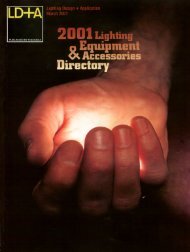Research matters - Illuminating Engineering Society
Research matters - Illuminating Engineering Society
Research matters - Illuminating Engineering Society
You also want an ePaper? Increase the reach of your titles
YUMPU automatically turns print PDFs into web optimized ePapers that Google loves.
CAREERS & HIRING Recruiting At The Upper Levels<br />
Paul Pompeo<br />
SO YOU HAVE AN OPENING.<br />
There are basically three ways your<br />
company can fill it:<br />
1) Word of mouth<br />
2) Ads/job postings<br />
(usually through the Internet)<br />
3) Engage an executive search firm.<br />
All three methods can be effective,<br />
depending on the company, the<br />
position, the market and the company’s<br />
urgency in filling the position.<br />
First off, if the position is an<br />
inside sales representative or<br />
another at this level, an executive<br />
search firm may not be your best<br />
route. Either a local search firm<br />
specializing in clerical and administrative<br />
positions or an ad in your<br />
local paper or local job board can<br />
often be effective for a position at<br />
this level (results may vary based on<br />
the unemployment rate in your<br />
local area).<br />
Word of mouth can be a useful<br />
tool in uncovering candidates. As<br />
our industry seems to get both<br />
larger and smaller with time, asking<br />
“Who do you know?” is also an<br />
effective way to fill some positions,<br />
particularly in a local market. The<br />
drawback is you mostly find people<br />
who are either actively looking or<br />
out of work, meaning you may miss<br />
the “best” candidate for the job.<br />
Internet job postings and ads can<br />
often be an effective tool, as well.<br />
The Internet has in many instances<br />
essentially replaced the newspaper<br />
ad of days past. Most positions<br />
posted on Internet job boards will<br />
draw a large amount of responses.<br />
Some will be replying to your specific<br />
ad, and some may have put<br />
parameters in that job board site<br />
that will automatically send their<br />
resume to any job posting that<br />
meets certain parameters or word<br />
matches that the candidate specifies.<br />
Candidates out of work and<br />
available or those who are actively<br />
looking will even sometimes post<br />
their resumes on some job sites.<br />
Like the “word of mouth” method,<br />
this technique can be used at a relatively<br />
low cost.<br />
Recruiting Trip<br />
However, if the position is in<br />
sales, engineering, marketing, or a<br />
position in middle or upper man-<br />
agement, your best bet may to be<br />
use a search firm. Think about it,<br />
would you attempt to defend yourself<br />
in a court of law? Administer<br />
your own diagnosis for an illness?<br />
Handle all your own accounting and<br />
tax issues directly? Most likely not.<br />
Then why tackle the critical task of<br />
hiring?<br />
How do you find the right<br />
recruiting firm? Industry directories<br />
will often list search firms, but I recommend<br />
using personal recommendations.Talk<br />
to several business<br />
contemporaries whom you respect,<br />
and ask them for the names<br />
of two or three recruiters they<br />
have used or have heard good<br />
things about. Contact at least two<br />
or three. Part of a successful relationship<br />
with a recruiter is chemistry<br />
and work style, just as it is<br />
when you choose a doctor or an<br />
attorney.<br />
Fees will vary as well as types of<br />
search—retained or contingency.<br />
But don’t let price be your sole<br />
determining factor. While most<br />
established search firms in our<br />
industry work at somewhat similar<br />
(if not identical) rates, the cheapest<br />
is not always the best. Those firms<br />
with unusually cheap rates will not<br />
be providing the same sort of follow-up,services<br />
and/or ethical standards<br />
that others will. They simply<br />
can’t afford to.<br />
Other Factors<br />
What follows are some other<br />
reasons why using a recruiter may<br />
make sense:<br />
• Even in a sluggish economy when<br />
employers may perceive that it’s a<br />
“buyer’s market” and they have the<br />
leverage, the best candidates, for the<br />
most part, are still employed. While<br />
top performers can find themselves<br />
unemployed, it is usually for a very<br />
brief time.And keep in mind, when<br />
companies need to downsize, they<br />
don’t release their top people—<br />
they let go marginal performers,the<br />
lesser contributors and/or the<br />
“problem” individuals.<br />
Meanwhile, we often find candidates<br />
who take a position while out<br />
of work often stay at their new<br />
position for a shorter period than<br />
candidates who were currently<br />
employed at the time. Why? Like<br />
the old country song says, “The<br />
girls all get prettier at closing time.”<br />
While that song may not be politically<br />
correct, an analogy can be<br />
drawn.To a candidate out of work,<br />
your position may look much more<br />
inviting to than it would if he was<br />
currently employed. The danger to<br />
you, as an employer, is this: Is your<br />
potential employee interested in<br />
your company because he/she really<br />
sees the position as the next<br />
career step, or is it a “safe port in<br />
the storm”—a place to stay until<br />
the right opportunity comes along?<br />
On the other hand, employed candidates,<br />
though they may not be<br />
completely satisfied in their current<br />
positions,still are more likely to join<br />
your company because they want<br />
to, not because they have to. And<br />
there is the critical difference.<br />
I often talk with companies who<br />
will find the person they thought<br />
was a “bargain”—completely available<br />
because they were unemployed<br />
at the time and very flexible<br />
on dollars—has suddenly left, or<br />
performed in a manner causing the<br />
employer to have to replace<br />
him/her. In short, the old axiom of<br />
“you get what you pay for” doesn’t<br />
just apply to purchases you make. It<br />
also applies to employees you hire.<br />
• Searching job boards or reviewing<br />
countless e-mail replies to postings is not<br />
the best use of your (or your staff’s)<br />
time. Besides having to wade<br />
through the resumes of the unqualified,<br />
unhappy and/or unemployed,<br />
try calculating the actual time spent<br />
on reviewing/contacting/interviewing<br />
these candidates. This doesn’t<br />
even take into account the cost of a<br />
hire of one of these candidates that<br />
doesn’t pan out; the time spent<br />
looking for a replacement, the lack<br />
of productivity while the candidate<br />
was employed and the drain on<br />
your sales and/or profitability when<br />
the position is open again. Also,<br />
what are the projects you or your<br />
managers could be working on<br />
instead of opening endless attachments,<br />
usually of unqualified candidates?<br />
These are the hidden costs<br />
that quickly eat into your profits<br />
even while you think you are saving<br />
money by going it alone.<br />
. . . . . . . . . . . . . . . . . . . . . . June . . 2004 . . . LD+A . . . . 26. . www.iesna.org<br />
. . . . . . . . . . . . . . . . . . . . . . . . . . . .

















